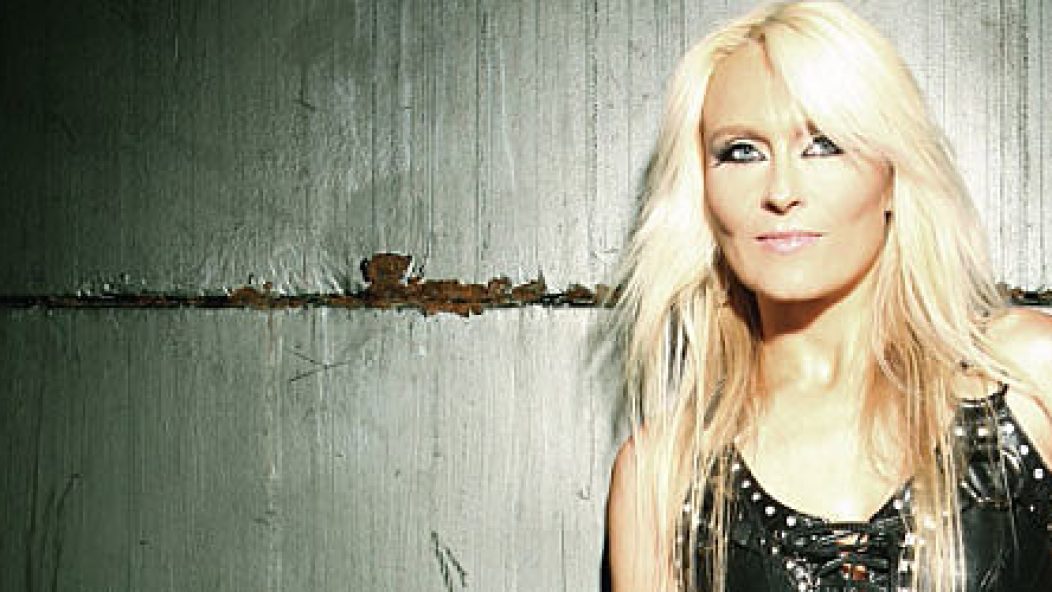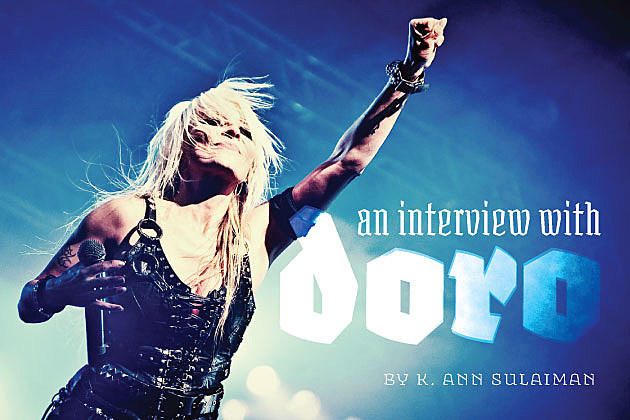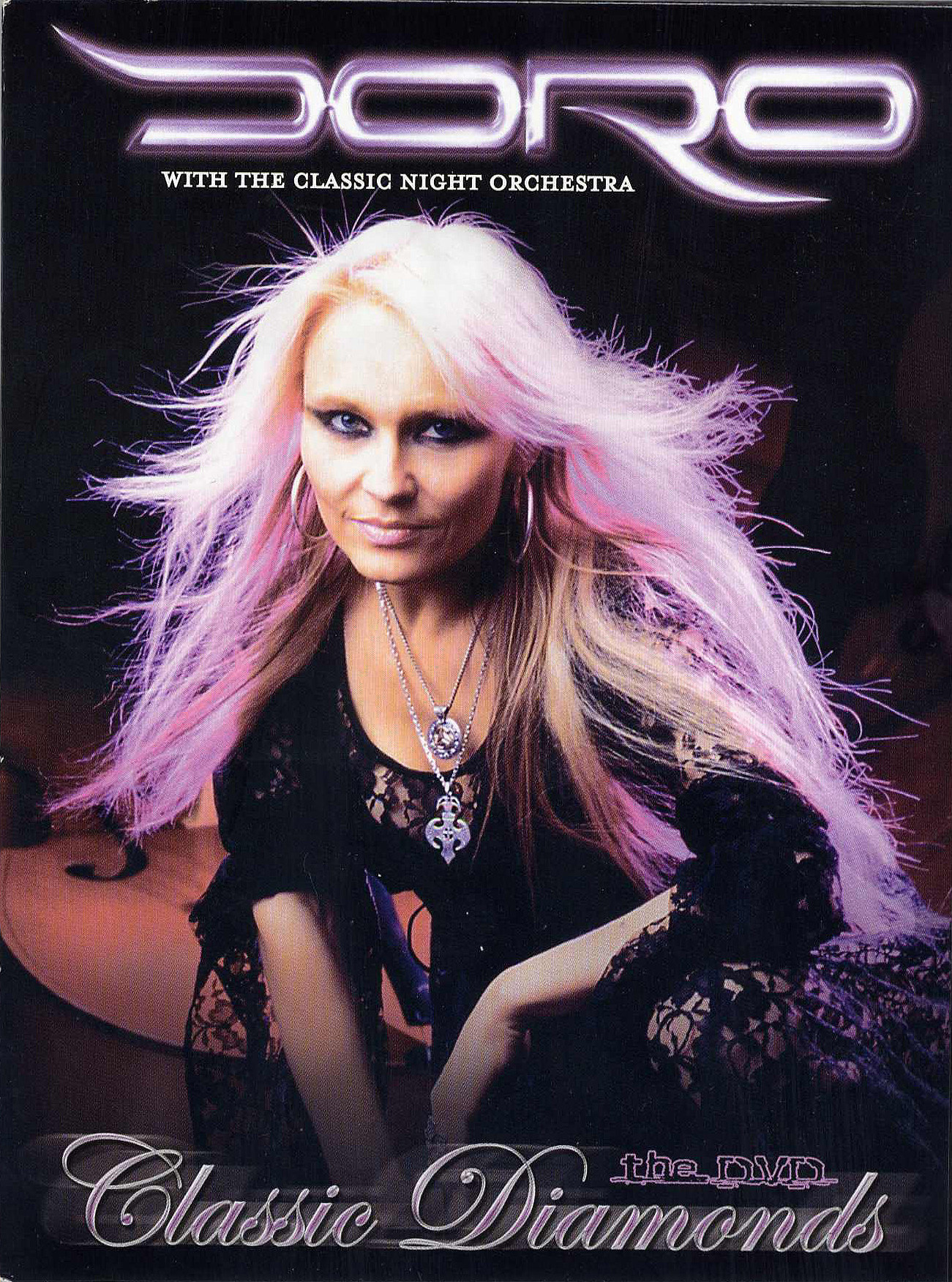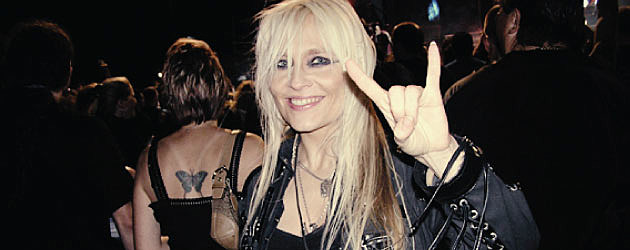
Interview: Doro
We are often warned that we should never meet our heroes, since we might not like what we see. However, there are always exceptions; namely, if your hero is as passionate, talkative, and warm as Doro Pesch, the woman often hailed as “Metal Queen”. It was just two years ago that she celebrated her 25th year of being involved in music, and 2011 marks the release of the DVD commemorating the occasion. There’re many questions people might want to ask Doro: what does it feel like to be a woman in the metal world? Does she like new metal at all? Where will she tour next? In this interview, however, I wanted to focus on the questions that really mattered to me, and let her tell all in her own time.
. . .
At this point, it’s been more than 25 years since you’ve been involved in music. How does it feel?
It feels great! I’ve always wanted to do music, and the longer I do it, the more I love and appreciate it. After the second record in 1985, things were so hard that I thought I would never make another one. Now we’re working on album number seventeen, and the anniversary DVD’s coming out! I guess that somehow you live and learn; in the beginning, I just wanted to do metal music which was a hobby when I started out with my very first band Snakebite back in 1980. Then we eventually formed Warlock, which was born at the right time and in the right place when we realised that we were a part of the heavy metal scene! When we did our first album, Burning the Witches, we didn’t think anything of it. Then it was suddenly selling like crazy with about 25, 000 being sold within the first week, and we had no idea that people even knew about us! By the time we switched to a major label – Polygram Records – for the second album, it was not only more professional but also much more pressured. It felt pretty hard, but at that point, I had already decided that I wanted to be involved with music for the rest of my life.
I feel so happy that we survived; the DVD is called 25 years of Rock, and we’re still going strong! Even stronger than ever – the time for metal is really great, and I got to see the great ’80s as well as the ’90s when grunge’s popularity made it difficult for heavy metal bands to survive. But now after all that, it’s fantastic again! Metal is coming back!
On your DVD, you’ve got a cover of Judas Priest’s “Breaking the Law”. I know that you’ve often mentioned your love for them, but why else did you pick this song?
Well, my first big tour was with Judas Priest in ’86, and it was amazing! My band Warlock and I were treated very well as the support act on the Turbo Tour; we always got the sound check and a whole light show. Then at the very last show, when we played the song “Burning the Witches”, they made sure we had all the pyrotechnics and fireworks for it. It was like their gift to us, and I had always wanted to say “thank you” to them for their kindness.
Since I had wanted to cover one of their songs for a long time, it happened that while I was picking out what tracks to play with the Metal Orchestra (for the album Classic Diamonds) that this felt like the right opportunity. “Breaking the Law” was always my favourite of Judas Priest’s, so when I tried it, we decided to start out slow before becoming more dramatic. We were a little band from Germany, and they took us to the biggest stadium on their world tour, which was such an honour. I also wanted to ensure that my take on “Breaking the Law” was still cool, because it’s hard to top the original. When you make it slightly different however, it becomes interesting to listen to, and Priest themselves said that they enjoyed it!
. . .
. . .
Lyrically, you have a more sensitive approach to your subject matter than most traditional heavy metal acts. Case in point, “I Lay My Head Upon My Sword” which subverts the atypical theme of war…
It’s actually very hard to create a more gentle side to this; I tried many times before to write an anti-war song which was not only positive but also sounded great. The world is so screwed up that I no longer see it as “fun” to support the idea of war or violence, even though I enjoyed it so much in the beginning with Destruction’s lyrics and Metallica’s Kill ‘Em All. Now I want to make a stand against war and fear, so I can help people and fight for what’s right. Personally, I want to empower others and offer them hope and meaning. I’ve had tragic events happen in my life over the last few years, so I know how it is to feel not only desperate but also near-suicidal. The song “Undying” for instance, was written because both my dad and my guitarist had died at the same time. Sometimes it is just fun to rock out and be against everything, since music is such a powerful outlet for that, but on the other hand something positive has to be given back. I like anything uplifting, even the idea of angels, despite not being a religious person. At one point, I was lucky enough to play shows where all the Native Americans were, and they showed me many wonderful things that had a good energy to them. Religion though has many negative sides to it; sometimes it gives me the creeps that people use it so horribly. When it doesn’t lead to love and support for one another, then that can’t be right!
The DVD also features an all-female version of the song “Celebrate” where you’ve gotten together front-women from various metal subgenres, like Floor Jansen (formerly of After Forever), Ji-In Cho (Krypteria) and Sabine Classen (Holy Moses). In what ways do you consider it different to perform and record with women compared to performing and recording with men?
I must say that I believe that every person has an individual style. I don’t even see the difference between a male musician or a female musician – some people have high energy, some are just more sensitive and introverted. For me, music is above it all; at the start of my career, I’d be asked who my role models were, and my answers were always Ronnie James Dio or Rob Halford – never any women! Dio especially was my item of inspiration not just as a songwriter but as a person as well, and I still can’t believe that he’s gone; I miss him so much. When I had the chance to fill in for Ripper Owens on the Dio Disciples tour in Spain this year, I had to re-listen to his songs. I learned so much about music from this experience. Even though I knew most of them by heart as a fan, as a musician I had to sit down and listen to all of them about 200 hundred times. I found so many nuances and meanings between the lines which I hadn’t known about before. To me, it doesn’t matter. When your heart beats for music let alone metal, that’s all it takes.
You sound like such a passionate person and a dedicated music lover – just what does metal mean for you, personally?
For me, heavy metal has always meant that you have the freedom to do whatever you want with energy and emotion! I love it: from super hardcore, to super sensitive – I love the emotion of power ballads and anthems, too! Metal is not superficial to me, like trying to make a hit single, but it’s a living, breathing form. I think that metal fans are pure and true at heart in what they feel, say and live by, and I love them as they have a heart of gold! Non-metalheads don’t understand this, as they see metalheads as wild and will even mistake aggression for excitement. I love to express myself in any which way and form, and I see metal as a genre with the most loyal fans in the world. Belonging to the metal scene is like being part of a huge family worldwide, and I always feel at home whenever I see metalheads. I think that we are all one, even though the styles and sounds of metal and its subgenres are so diverse. In the end, it’s all metal.
I often like to ask seasoned musicians what they think about the past- especially in regards to scenes like punk and hardcore, the metal world’s love for “the olden days” is pretty strong!
I know what you mean. I think that today, while there is much more variety, life has also become much harder. In the ’80s, I remember feeling more freedom to do whatever I wanted to, with much less pressure. Now that there is more turmoil, with terrorist attacks and natural disasters [being reported]. Even with the computer age, people have many more hobbies where one thing (like music) is never enough for them. I’ve seen this in my band; when we used to tour in the past, we were constantly talking with one another in the tour bus and the dressing room. Now I see that everything has become dead quiet, since everyone is playing with either their computer or iPhone. So many things are demanding your attention! Myself, I don’t even have a family like a husband or children – to me, the metalheads are my family, but at this point I honestly can’t devote any attention to other people like that. I’m not even getting enough sleep to get the job done!
You also can’t keep up with what’s going on anymore in the music world – there’s so much information out there, but I do try to contribute by means of helping younger bands get more exposure and even a record deal through the Wacken Foundation. Back in the day, my boss at Polygram Records told me that maybe after seven years together we could earn enough money to buy food. These days, you can’t even be signed to a label for that long! If the first album you release doesn’t catch fire, you won’t make it.
. . .
. . .
So based on your own experiences, what would you say the music industry should do to help both established bands and newcomers?
Well, that’s hard to say, because it’s obviously different, but I would say that record companies should have a longer commitment to their bands. They should not only give younger bands more time to develop and earn a fan base, but also believe and stick with them for longer than a couple of years. A fun fact – in the beginning my band and I made our decisions on which labels to sign up with for funny reasons – for our first album Burning the Witches we had a lot of offers from independent labels and decided to pick the one with the coolest logo! We were die-hard metalheads, and we thought that the logo for Mausoleum (a small Belgian company) was the coolest one. The first and last ‘m’ were dripping blood, and we thought “that’s so awesome – they understand metal!”
The fans have to co-operate to help bands, as well…
Yeah, it’s great when fans come to live concerts! There’s nothing like seeing a band play live rather than in a YouTube video – it’s great when audiences go to shows for even the newcomers, since it’s always an inspiration to see and talk to them in person. Sometimes you’ll hear about how they got married to one of your songs, which makes you think about writing more material that would mean something to people. In this day and age, it seems that people stick to their gadgets for so long that they may not want to go out to make a 5 – 6 hour journey to see a band. But it’s always worth it! I’ll tell you a funny story – in the ’80s, there weren’t any magazines for us to read about upcoming new metal bands, so I didn’t know much about the groups I heard except that I loved them. So one time in Germany, my friends and I went to see Judas Priest. When we came late into the concert hall, since I had been working at the time, there was already a band onstage and I told my guitar player, “That’s the greatest thing! Judas Priest are my heroes!” before he told me, “That’s not Priest; that’s the support band – they’re a local group from Germany, and they’re called Accept.”
As you’ve had such a long and interesting experience in the music industry, what else have you learned the hard way, so to speak?
When I started out, I never thought that things could go wrong. I used to think that everyone was our friend, but then I learned the hard way that there’s more to the music business than those who love it, and we had to learn how to survive without either our name or money. It was totally surprising, especially as I thought that in the metal music business all that mattered to people was passion, but there were many sharks around. When Warlock was on the peak of its career, our manager at the time (who was also the merchandiser) stole all of the money that we made but never got to see. We sold millions of t-shirts at the time, which made us the third biggest selling merchandised band after Metallica and Iron Maiden. Because we didn’t know much about the business, the manager took all the earnings and made sure that the band didn’t get anything. We even had a deal where 90 per cent went to him, and just 10 per cent of the money went to Warlock! The manager we got for America was the one who helped us to change things around, and in the end, the European manager reacted to this by not only quitting but also taking away Warlock’s income and recording budgets. I remember talking to the record companies about this, as we didn’t see any of the budget they gave us! Afterwards, I thought that we’d survive, but then our former manager took Warlock’s name, so we couldn’t perform anymore under our name! We went to court many times, but the band members and myself didn’t have the resources to pay for the lawyers. In the end, he kept the name ‘Warlock’ which was at a bad time for us; people internationally were becoming interested in our music. It was all going really well, before suddenly coming to an end.
To survive, I pretty much began my solo career without doing a solo career, and later on, the management and labels replaced the other band members. It wasn’t my choice – I just wanted to play and sing! I think that the time is right as we’re again on an independent label (Nuclear Blast), who have already released the DVD in Europe. I’m happy to be on such a label again; back in the day, being on a major label meant that you did have a lot of promotion, but you also had so much being invested in your image, the producer and the like, which I had a hard time dealing with because I only wanted to be honest with myself.
I honestly do feel that independent labels have a much deeper understanding of the music that they deal with, since the people usually sitting in their offices are die-hard metalheads who know and understand what’s cool and what the fans like. As an example, I was glad when I moved from Warner Brothers to SPV in the past. Warner Brothers was a huge company, but I also had to compete with pop artists like Madonna; whereas for metal and rock bands there are different laws. You always have to see how to keep your credibility and remain interesting to your fans, so it was a good decision when we switched labels. It was also the first time in ages that our record came out again worldwide because of SPV’s global distribution. Warner Brothers was huge, but they only concentrated on the big markets rather than smaller markets like Columbia or the Netherlands. Worldwide distribution from SPV meant that we could go on tour to these countries again. The music end and the business end were always colliding; I’d say that besides grunge in the ’90’s, coping with that wasn’t easy throughout my career!
. . .
HEAR DORO
. . .
. . .
“Herzblut”
. . .
http://www.youtube.com/watch?v=33TbR_1Mx7g
Warlock – “Burning the Witches”
. . .
BUY DORO
Amazon (CD)
Amazon (MP3)
AFM Records (Orange Vinyl LP)
. . .














